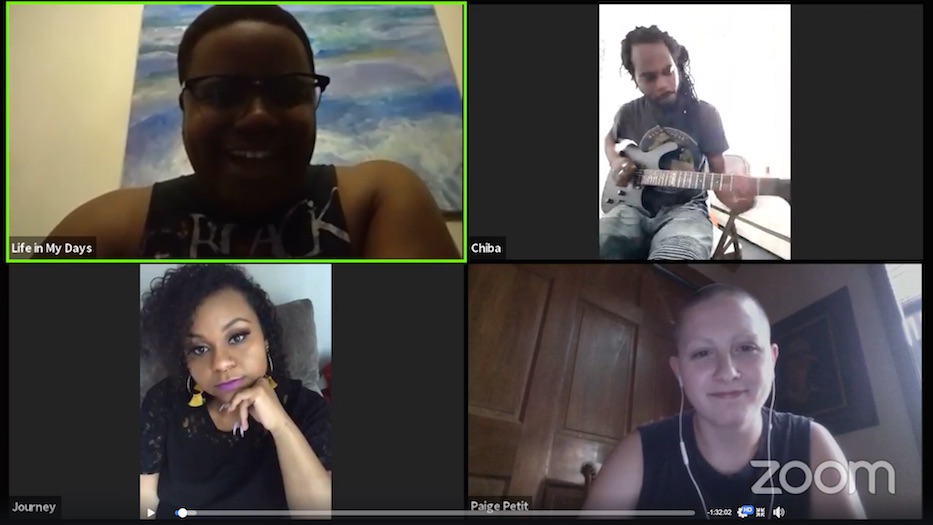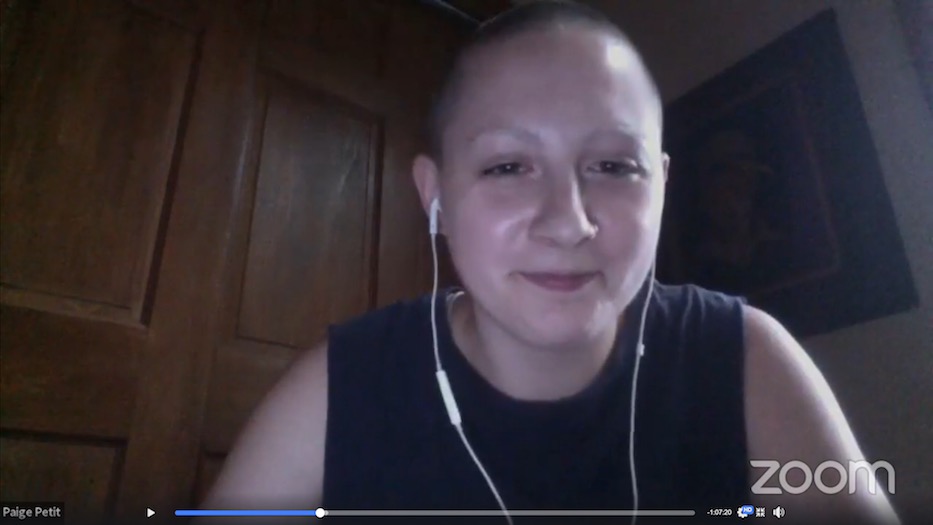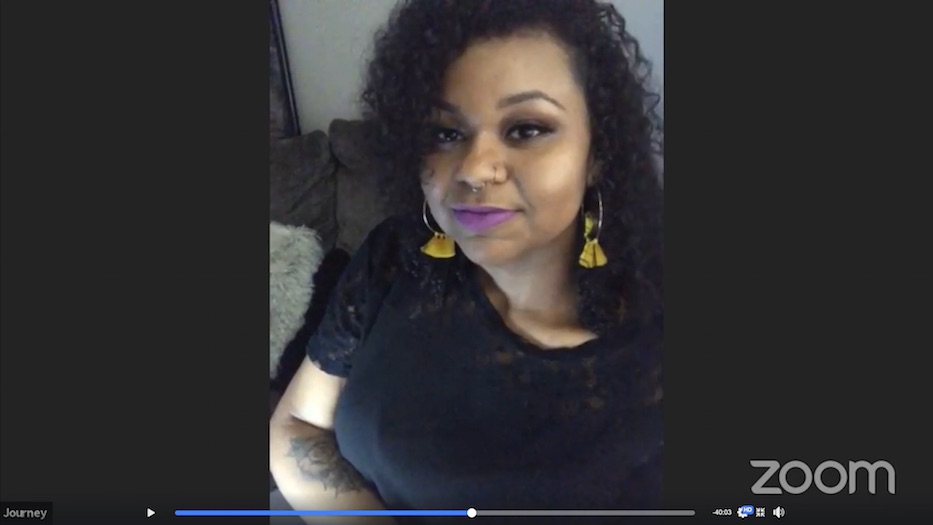
Poetry | Arts & Culture | Visual Arts | Life in My Days
.jpeg)
| Sammy Chiba's Artwork. Zoom Screenshot. |
Slow and somber blues notes filled the room. Sammy Chiba swiveled around in his chair strumming “Red House,” written and popularized by Jimmy Hendrix in the 1960s. The song picked up speed and slowed down once again. Chiba smooth vocals recounted the story of an old love who has moved on. There was no rush that night.
Chiba, a visual artist and member of Voice of Changes, appeared as part of the inaugural Life in My Days Art Gallery and Community Conversation series this past Saturday. Jamarr “Jabari” Farmer, program coordinator for Life in My Days, moderated the presentations. The programming was originally slated for a March in person launch, but was moved online due to COVID-19.
The evening concluded with a discussion on Immigration and Customs Enforcement (ICE), led by CJ, a member from Unidad Latin en Acción and Black and Brown United In Action.
Distortion and determination were recurring themes through the night. Chiba held up an abstract painting of a golden tree encased by vibrant gold, white, and blue jagged lines.
“I was trying to take something everyone knows exists and build around it with my abstractions,” he said.
The most familiar part of the night was Chiba’s commentary on COVID-19, including the presence of misinformation and lack of a uniform response from government officials.
“Covid makes me anxiety ridden,” he said. “Wear a mask, don’t wear a mask. Who do you listen to? The CDC?”

Paige Petit continued the evening with a mixed media presentation of both visual art and spoken word via powerpoint. The work touched on ideas of gender expression and queerness as experienced by Petit. At the beginning of their presentation, there was some confusion about how to screen share—a gentle reminder that even months into COVID-19, technology is no replacement for in-person gatherings.
The presentation opened with a skeletal hand digging into a bursting red heart, leaving a hole behind as it retreated. Skeletal figures were prominent in their work, and often juxtaposed with softer elements of natures.
“Come back with hair next time / a sad refrain repeats / a memory that persists through time / has a feeling like fresh coldness and a sound like cats wailing in discomfort /as if to say please fix this / and I’m just thinking what’s the problem.”
The problem was not Petit’s but outside perceptions from those unwilling to accept them. Strangers have called them the “male GI Jane” or offered $5 to rub their head.
“He screamed so loud, he shook the walls," they read. "I couldn’t ignore it by reading a book. I couldn’t ignore it with headphones in. Our shared wall is too thin.”
.jpeg)
Ignoring outside gazes and words is a coping mechanism for Petit, they explained. A later song asked for everyone to “Shut up, Shut up, Shut up…” so they could have a rare moment of peace in an overwhelming environment.
Despite the constant barrage from outside, Petit remained optimistic. Old gays at the dollar store, vibrant gardens, and supportive people are just a few of the interactions that give them the energy to push through life.
“Within us. We have everything we need,” they said.

Carol Ann “Journey” Jackson, a self-taught visual artist and poet, created a gallery space in her own living room. A dozen portraits of experimental work centering Black women and celestial themes covered almost all of the walls.
Tucked in the corner of the living room was a poster of Tupac Shakur with lyrics: “Instead of a war on poverty, they got a war on being Black, So the police can bother me,” written in bright red acrylic paint.
Jackson had altered the original lyrics to Shakur’s 1992 "Changes." The original flows: “Instead of war on poverty they got a war on drugs, So the police can bother me.” She said that she plans on bringing this poster to future rallies as a commitment to art in action.
Her poetry navigated body positivity, Black feminism, and poverty through the lens of her lived experience. Her poetry was a collective work, as she included perspectives beyond her own and in return offered these poems to different members of her communities as love letters.
.jpeg)
“I am from a city where my brothers and sisters had to get it from the mud / where not a lot of people showed us love / where people from the outside were quick to call us thugs / people are so quick to judge / I am from a city where many of my friends had to get it by any means.”
She recited “Unapologetic,” a body positive feminist poem, asking women to be freed from unrealistic beauty standards and embrace their natural forms.
“This poem is for you, for you, and for you.
Every brown trans cis women out there
It is time for all of you to know the truth
Our value tends to be dictated by our size...
Your worth could never be determined by the number on a scale.
The size of jeans will never tell how amazing you are.”
She paused and took a deep breath.
“I needed to hear that recently.”

The event concluded with a discussion on abolishing ICE led by CJ, a member of ULA. She highlighted the recent immigration raids deporting undocumented essential workers who were unable to work from home.
ICE’s raids and deportations have aided the spread of COVID-19 both domestically and abroad as coronavirus-positive detainees continue to be deported. As of July, more than 3,000 detainees have tested positive for COVID-19.
CJ also addressed the lack of Black subcontractors involved in the construction of the Q House on Dixwell Avenue. Less than 10 percent of subcontracts have been awarded to Black-owned small businesses, and approximately 8 percent of the total workforce is Black.
ULA has planned action on July 14 at 5 p.m. in front of the Q House at 197 Dixwell Ave. The next Art Gallery and Community Conversation will be held on July 25.

